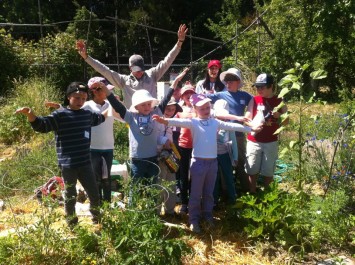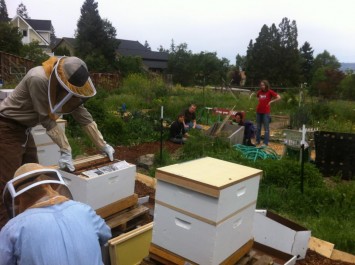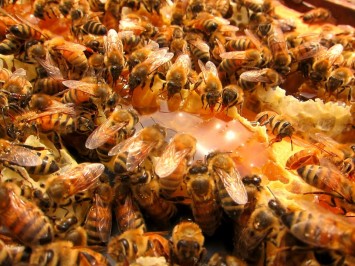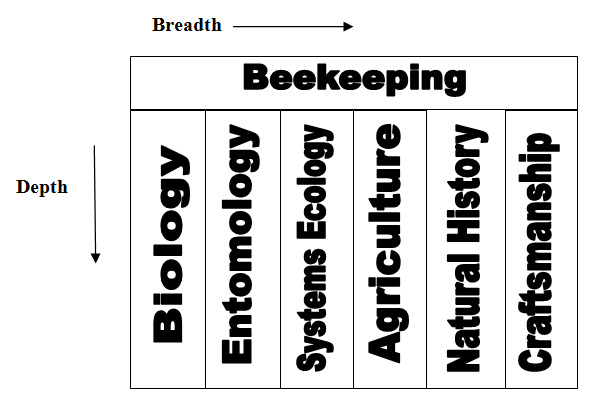Beekeeping as Experiential: The Ashland Apiary Project
Abstract: The Ashland Apiary Project is a multi-pronged, multi-aged learning design that uses beekeeping as a thematic avenue for hands-on experiential learning and the cultivation of land stewardship. The project is a student-led, collaborative effort by Southern Oregon University to establish an on-campus apiary that serves as a model of place-based and community-based education for a wide audience of students in an elementary, secondary, and collegiate setting. Through the Ashland Apiary Project, the pedagogic approach of “apiary-based learning” is considered in the field of sustainability education.
Keywords: Apiary-based education; beekeeping; experiential learning; place-based education; school gardens; sustainable agriculture; project-based learning
Over the course of my graduate studies, the following set of seemingly random facts crossed my path:
- It is estimated that one third of the human food supply depends on insect pollination, most of which is accomplished by honeybees.
- Since 2006, these same bees are experiencing a rate of attrition alleged to have reached new proportions.
- Annual state spending on standardized tests increased 160% following the passage of NCLB in 2002.
- Nearly one in 10 American children today now receives an ADHD diagnosis.
- Roughly 70 percent more food production will be required by 2050 to meet a growing world population.
- For every one farmer under the age of 25, there are five who are 75 or older.
These facts only appear to be random. In reality, they are not random at all but part of a larger pattern that includes titanic agroindustry and overpopulation, a stuffy indoor school curriculum and proliferating standards, cosmetic policies and divided policymakers, and place detachment. How we see and think about these things as disconnected entities only perpetuate a mindset of industrializing rather than sustaining the earth. Before us lies the challenge to find solutions to impending cultural shifts. Some of these shifts will include a fundamental reorientation of how we grow food and strengthen local food networks, a radical redesign of our built systems to conserve resources and increase biodiversity, and a renovated model of education to prepare the next generation for climate change. One possible model for such a shift revisits the age-old practice of keeping bees.
The Ashland Apiary Project
The Ashland Apiary Project was conceived as a tool to compress some of the issues of sustainability to a manageable scale. Southern Oregon University (SOU), a public liberal arts college located in Ashland Oregon, provided a launch pad for the Ashland Apiary Project to take flight. On the wings of strong partnerships and a crescendo of student interest, three beehives, managed by university students under the mentorship of Sarah Red-Laird, a local beekeeper who runs a nonprofit organization called BeeGirl (www.beegirl.org), were installed adjacent to the campus community garden. The Ashland Apiary Project pivots on intertwined environmental and educational goals. At the core of this project is a multi-pronged, multi-aged learning experience that uses beekeeping as a thematic avenue for dynamic hands-on education and the cultivation of land stewardship.
Beekeeping as Pedagogy: Educational Goals
David Sobel (2004) describes how environmental education might be locally reconceived through a blend of school, environment, and community. This place-based approach grants a way to engage young people in local actions that restore the health of local social and natural systems. According to Smith (1992), instead of physically separating children from the natural world, “educators must strive to create learning experiences that break beyond the boundaries of the classroom and root themselves in the broader environment.”
Beekeeping is the delivery model of transdisciplinary learning for a wide audience of students in the elementary, secondary, and collegiate settings. The term “apiary-based education” parallels the theory and practice of garden-based education; both utilize a concrete metaphor to create and enhance curriculum. In theory, the Ashland Apiary Project promotes “apiary-based education” as a pedagogical tool for experiential learning. In practice, just like school gardens, the Ashland Apiary Project provides opportunities for students to put their academic learning to practical use.
A TransdiscipLinary model of Apiary-Based Education:
The Ashland Apiary Project is comprised of the following educational goals:
- Creating a curriculum framework for both K-12 and post-secondary to infuse courses with experiential learning concepts embedded in apiary studies;
- Awakening a new generation of adept workers in the field of conservation biology and sustainable agriculture; and,
- Offering scientific research opportunities for SOU undergraduate and graduate students in related subject areas, such as entomology, conservation biology, microbiology, environmental science, and botany, to name a few.
Beekeeping as Ecology: Environmental Goals
Most U.S. farmers rely on a single managed pollinator, Apis mellifera, a species that is experiencing declines in number due to a collection of factors, including habitat fragmentation, monocultures (resulting in poor nutrition), the loss of native flora, and pesticide use (National Research Council 2003). Habitat degradation that eliminates or reduces pollinator populations disrupts communities, and in extreme cases reduces or eliminates key ecosystem processes. It is of no surprise, then, that the success of crop pollination services provided by honeybees will be most influenced by the ability of human societies to embrace efforts to conserve habitat.
Located in a bioregion of incredible biodiversity, SOU provides a nutritious loam to promote the health of honeybee colonies, the integrity of the practice of beekeeping, and the pollination services provided by honeybees to local agriculture and food networks. In this vein, the Ashland Apiary Project supports the protection, conservation, and restoration of natural systems upon which our welfare ultimately depends.
The Ashland Apiary Project is comprised of the following environmental goals:
- Exploring causes and consequences of, as well as responses to, declining honeybee populations;
- Empowering young and old citizens to restore fragmented and damaged habitat with native flora for pollinators; and,
- Inspiring ecologically sustainable practices on school campuses and within the community.
Catching the Buzz: A Model for Experiential Education
 Just as a bee colony operates as a “superorganism”, the Ashland Apiary Project is a joint effort by many ‘worker bees’ to advance the educational and environmental goals of the project. The project fosters a place-based and experiential learning design that uses beekeeping as the epicenter of multi-tiered social and environmental change in diverse settings.
Just as a bee colony operates as a “superorganism”, the Ashland Apiary Project is a joint effort by many ‘worker bees’ to advance the educational and environmental goals of the project. The project fosters a place-based and experiential learning design that uses beekeeping as the epicenter of multi-tiered social and environmental change in diverse settings.
Similar to light refracted through a crystal, the outcomes of the Ashland Apiary Project will look different from different vantage points. To elementary students, they may participate in summer workshops taught by university students to study bee biology and plant-pollinator interactions. To high school students, they may contribute as valuable members in the SOU Beekeeping Club, collaborating with university students and securing post-secondary scholarships. To faculty, they may offer accredited agroscience and research courses using beekeeping as one lens of study. To community members, they may enroll in master beekeeping programs hosted at the SOU apiary to learn the principles and trade of apiculture. To teachers, they may support the establishment of an on-campus apiary adjacent to an existing or new school garden. To school district officials, when crafting policy, they may link best instructional practices with the value of experiential learning. A growing body of academic research supports the use of experiential learning in schools as a way to engage students, cut absenteeism, boost cooperative learning skills, and improve test scores. Findings from the Place-based Education Evaluation Collaborative reiterates the positive effect that situating learning in authentic contexts can have on student motivation, engagement, and self-efficacy (Billig et al., 2005).
A truly sustainable culture is uniquely informed by the local climate, geography, and ecosystems that are connected to that culture (Orr, 1992). In order to learn to live in such a way that these intricate natural systems are not compromised for future generations, we must develop a deep awareness and understanding of these systems and how human activities affect them. Rather than taking each system, whether it be human or natural, and studying it in isolation from the others, the Ashland Apiary Project connects these systems through the exciting hands-on experience of beekeeping.
truly sustainable culture is uniquely informed by the local climate, geography, and ecosystems that are connected to that culture (Orr, 1992). In order to learn to live in such a way that these intricate natural systems are not compromised for future generations, we must develop a deep awareness and understanding of these systems and how human activities affect them. Rather than taking each system, whether it be human or natural, and studying it in isolation from the others, the Ashland Apiary Project connects these systems through the exciting hands-on experience of beekeeping.
Speak to any beekeeper and you will find a deep appreciation between these tiny pollinators and their kindred guardian. Honeybees pollinate the seeds of our imagination, carrying with them mysteries and wonders digestible only through hands-on immersion. In other words, to understand the vast interconnectedness of our living world, we only need to drink from the sweet teachings of honeybees. Apiary-based learning provides attachment points for the acquisition of new skills and transformational experiences for all who participate.
The buzz is audible.
References:
Billig, S., Root, S., & Jesse, D. 2005. The impact of participation in service-learning on high school students’ civic engagement. Denver, CO: RMC Research Corporation.
National Research Council. 2003. Chapter 3- Causes of Pollinator Declines and Potential
Threats. Status of Pollinators in North America. National Academies Press.
Orr, D. W. 1992. Ecological Literacy: Education and the Transition to a Postmodern World. Albany, NY: SUNY Press.
Smith, G. 1992. Education and the Environment: Learning to Live with Limits. Albany, NY: SUNY Press, 15, pg. 95.
Sobel, D. 2004. Place-Based Education: Connecting Classrooms and Communities. Great Barrington, MA: Orion Society.












 Ryan King is a graduate of the Master of Science in Environmental Education program at Southern Oregon University and a licensed middle/high school teacher. His thesis project at Southern Oregon University explored the integration of beekeeping in K-12 school curriculum.
Ryan King is a graduate of the Master of Science in Environmental Education program at Southern Oregon University and a licensed middle/high school teacher. His thesis project at Southern Oregon University explored the integration of beekeeping in K-12 school curriculum. 

I LIKE THIS APPROACH IN ORDER TO BOOST BEEKEEPING EXTENSION SERVICES.KUDOS
Speaking of going thru the op’s topic we like this as it’s real and its pleasant to read from a poster that’s telling this for all to see.
Thanks for spending the time to share, I feel strongly about it and love reading more on this topic. Please keep updating your site with more info.
[…] Consequently, Ryan focused his graduate studies on apiary-based education. Over the two years he spent in Ashland, he established a hands-on, multi-age, multi-pronged beekeeping program called the Ashland Apiary Project. In his recent article “Beekeeping as Experiential: The Ashland Apiary Project,” Ryan lays out the educational and environmental goals that emerge from apiary-based education and the outcomes that he has seen manifest from Ashland’s project specifically. (http://www.jsedimensions.org/wordpress/content/beekeeping-as-experiential-the-ashland-apiary-project…) […]
[…] King has just written his graduate thesis on apiary-based education and is clearly a leader in establishing apiaries as a new place for […]